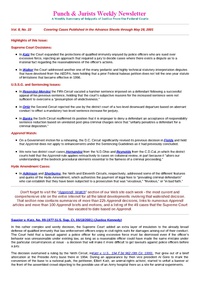Loaded on
May 1, 2001
published in Punch and Jurists
May 28, 2001
This case is noted as a rare example of a defendant successfully challenging a district court's refusal to grant him a sentence reduction based on acceptance of responsibility, pursuant to U.S.S.G. § 3E1.1. Because a district court’s decision regarding acceptance of responsibility is normally a factual issue, its ruling …
Loaded on
May 1, 2001
published in Punch and Jurists
May 28, 2001
Here the Court held that when a sentencing court imposes an enhancement for trial perjury as required by U.S.S.G. § 3C1.1, it is improper to then offset that penalty by granting a downward departure for "aberrant behavior" based on the same perjury.
The defendant in this case was …
Loaded on
May 1, 2001
published in Punch and Jurists
May 28, 2001
On April 24, 1996, most of the “limit-habeas-corpus-review” provisions of the Antiterrorism and Effective Death Penalty Act of 1996 (AEDPA) became effective - and the courts are still debating what Congress meant when it created some of those ambiguous and highly technical provisions. This decision resolves one of the …
Loaded on
May 1, 2001
published in Punch and Jurists
May 28, 2001
In this rather complex and wordy decision, the Supreme Court held that an officer may be immune from damages even if the court has found him liable under an entirely objective approach applying a previously announced rule of law. Essentially the Court added an extra layer of insulation to …
Loaded on
May 1, 2001
published in Punch and Jurists
May 28, 2001
In its earlier decision in this drug case (U.S. v. Fields, 242 F.3 393 (D.C.Cir. 2001) (Fields I) (P&J, 02/19/01)), the D.C. Circuit became the first Circuit court to hold that the Supreme Court’s decision in Apprendi v. New Jersey, 530 U.S. 466 (2000) required a jury to determine …
Loaded on
May 1, 2001
published in Punch and Jurists
May 28, 2001
Here, on their direct appeal, the defendants argued that their sentences of 240 months and 210 months, respectively, violated the Apprendi rule. Because that issue was not raised at the district court, the Sixth Circuit held that the claim could be reviewed for plain error only. Then, after noting …
Loaded on
May 1, 2001
published in Punch and Jurists
May 28, 2001
In this case, the Fifth Circuit invalidated a Bureau of Prisons Program Statement and ruled that a federal statute that requires the Bureau of Prisons to notify law enforcement authorities of the impending release of a prisoner convicted of a drug trafficking crime or crime of violence (18 U.S.C. …
Loaded on
May 1, 2001
published in Punch and Jurists
May 28, 2001
Here the Court vacated a harsher sentence imposed on a defendant following a successful appeal, holding that the court’s subjective reasons for the increased sentence were not sufficient to overcome a “presumption of vindictiveness".
In this case, the Fifth Circuit gave some meaningful teeth to the “presumption of …
Loaded on
May 1, 2001
published in Punch and Jurists
May 28, 2001
Here the Eleventh Circuit held that four defendants who were prosecuted in defiance of controlling precedent were entitled to attorneys fees under the Hyde Amendment since the prosecution was the type of vexatious case that the law addressed.
This case is the continuation of two earlier decisions, U.S. …
Loaded on
May 1, 2001
published in Punch and Jurists
May 28, 2001
Here Judge Potter concluded that the Apprendi-rule should be applied retroactively to cases on collateral review because it "alters our understanding of the bedrock procedural elements essential to the fairness of a criminal proceeding".
Although Judge Potter ultimately denied the defendant any relief on his § 2255 motion …
Loaded on
May 1, 2001
published in Punch and Jurists
May 28, 2001
http://www.nyed.uscourts.gov/doi/01cv1433mo.pdf.
Loaded on
May 1, 2001
published in Punch and Jurists
May 28, 2001
In this case, Judge Consuelo B. Marshall concluded that "the rule announced in Apprendi falls within the second exception of Teague [v. Lane, 489 U.S. 288 (1989)]" - which is reserved for "watershed rules of criminal procedure" that are essential to the fundamental fairness of a criminal proceeding. (Id., …
